https://www.spectator.com.au/2023/02/climate-change-short-on-proof-drowning-in-nonsense/
The environmentalist creed in context
Environmentalism, more particularly its prevalent global warming strain, dominates politics. It is the fourth such banner raised by the disgruntled that has conditioned politics since Medieval times.
Earlier eras saw politics underpinned by a struggle against government taxation which in the anglosphere can be marked by Magna Carta (1215), the English Civil War, and the American War of Independence. France experienced the ‘Fronde’ in 1648, which placed restraints on the king’s ability to levy new taxes, eventuating in the French Revolution a hundred and forty years later when the king was forced to convene a Parliament to seek new revenue sources.
Later, we saw nationalism as a clarion call for a new breed of activists to overturn established rulers thereby creating a new tapestry of sovereign states.
Then we saw socialism, often allied with nationalism but gradually, for the most part, overshadowing it.
Elites spearheaded all these movements, but they also had wide support.
Modern-day environmentalism has embraced forms of socialism – newly re-credited following its demise after the fall of the Soviet bloc – as well as having been reinforced by huckster self-interest in subsidies for politically correct energy supplies.
However, we have now seen a decade during which the projected increase in overall global temperatures failed to occur. The first chart below shows global temperature trends falling since 2015 (with CO2 continuing to grow) and the second chart shows a flat temperature trend for Australia since 2012.


It is no coincidence that the environmentalist catch-cry, the prevention of ‘global warming’, has morphed into ‘prevention of climate change’, which focuses on climate events that are portrayed as unusual and growing in intensity and frequency due to human-induced emissions of CO2 and other ‘greenhouse’ gases. Predictably, the latest IPCC report hysterically claims, ‘Climate change is bringing multiple different changes in different regions – which will all increase with further warming. These include changes to wetness and dryness, to winds, snow and ice, coastal areas and oceans.’
Global evidence of increasing severity and intensity of extreme weather events
Tropical storms and hurricanes cause considerable damage and loss of life. They have been meticulously recorded. Although many such events are accompanied by great publicity and claims of increased incidence and severity, the evidence for this is lacking.

Similarly, as the two following charts illustrate, losses from extreme weather events have tended to decline over the past 30 years. Climate-related deaths are now only 4 per cent of their level a century ago.

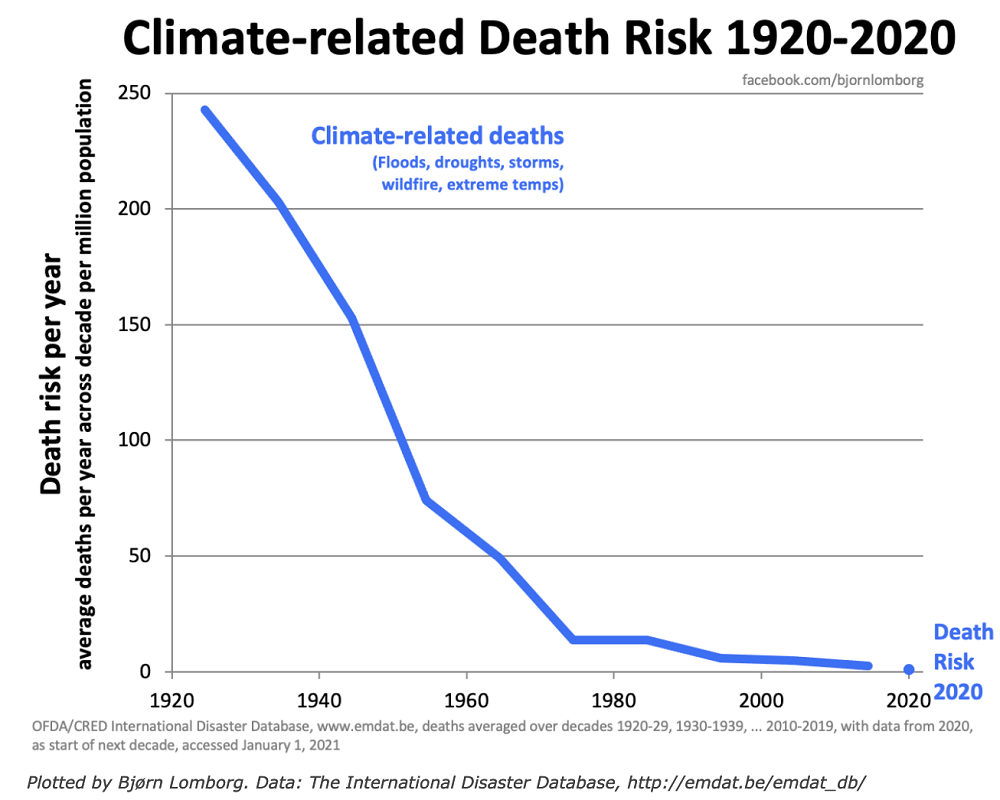
Is there Australian evidence of increasing severity of weather events?
Mr Albanese said reducing Australia’s contribution to global climate change was a ‘long-term solution’ the government is pursuing in response to increasingly frequent flooding. ‘Australia has always been subject of floods, of bushfires, but we know that the science told us if we continued to not take action globally on climate change then these extreme weather events would be more often and more intense.’ He added, ‘What we’re seeing, unfortunately, is that play out.’
Temperature
Australian temperature records at individual sites are controversial because of changes in recording stations’ locations and of the recording methods themselves (see Marohasy). As previously noted, aggregate Australian temperature trends have been similar to those of the world at large.
Rainfall
Ken Stewart finds that rainfall may have fallen in the last 30 years over Southern Australia but it has stayed remarkably constant in the long run.
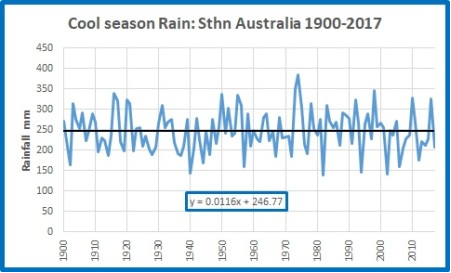
Using BoM data, Ken Kingdom finds, ‘Australia wide, and in the regions of Northern and Southern Australia and the Murray Darling Basin, since 1900 droughts of all lengths have become less frequent and less widespread. Victoria, Tasmania, and SW Australia have an increasing frequency of droughts of all lengths.’ He finds overall droughts are decreasing.
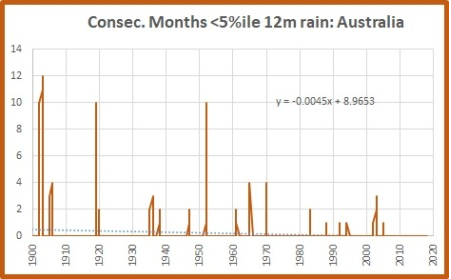
Jennifer Marohasy assembled annual rainfall data which shows variability since 1900 but no trend. And she notes, ‘The U.N. IPCC admits having ‘low confidence’ in even the ‘sign’ of any changes – in other words, it is just as likely that climate change is making floods less frequent and less severe.’
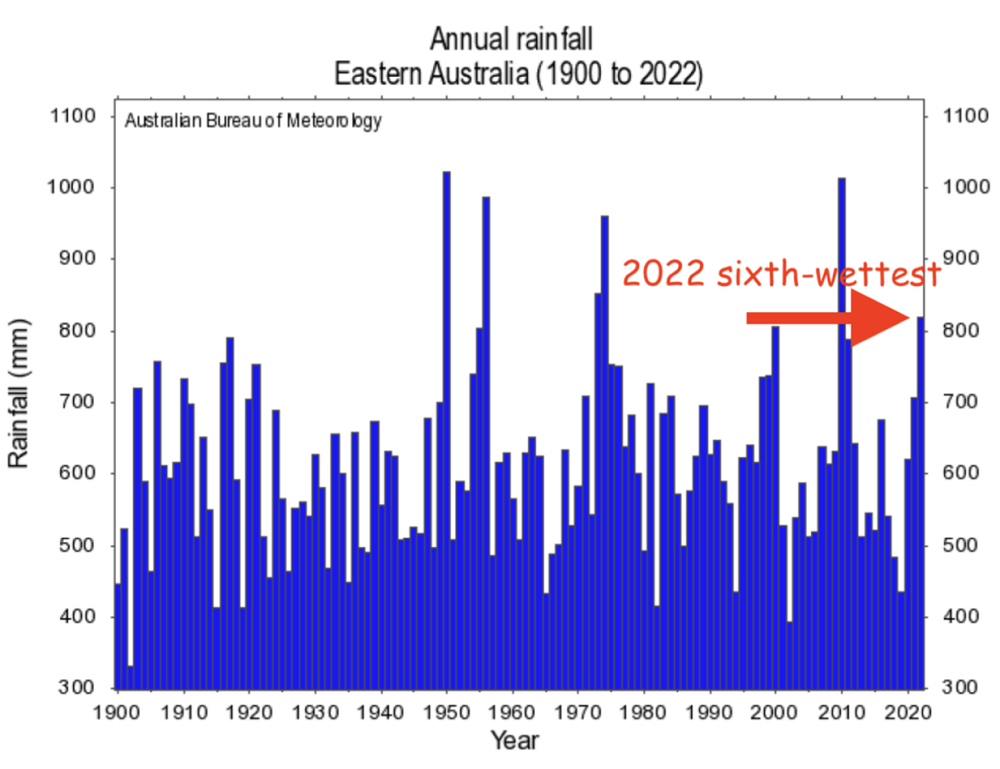
BoM rainfall data show a fifty-year trend of higher precipitation in the central latitudes and lower in the western and eastern latitudes. Indicating a lack of increasing extremes, there is no clustering of record daily or monthly rainfall patterns in the most recent years.
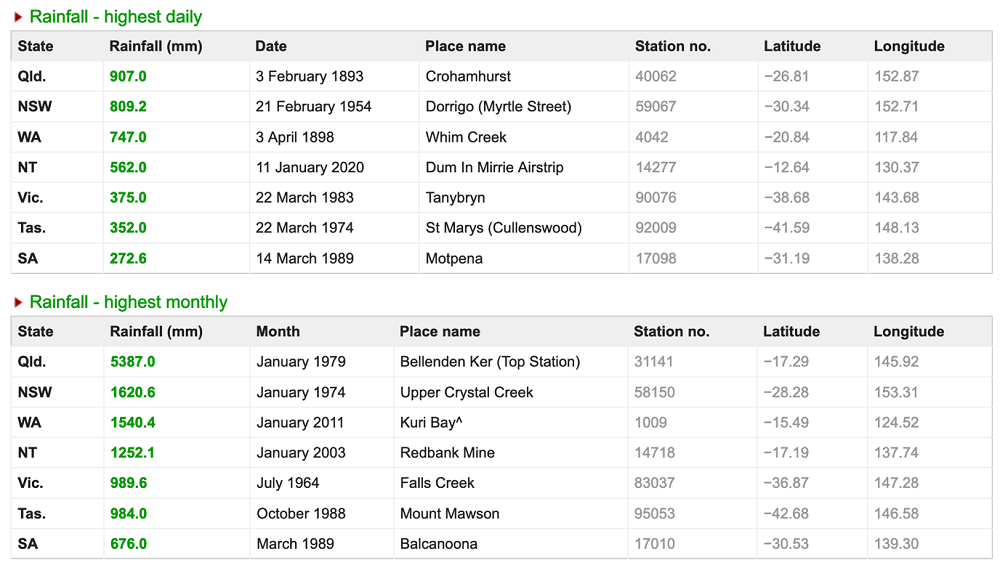
Flood markers attest to the fact that two recent unprecedented flood events are not as severe as in previous years.
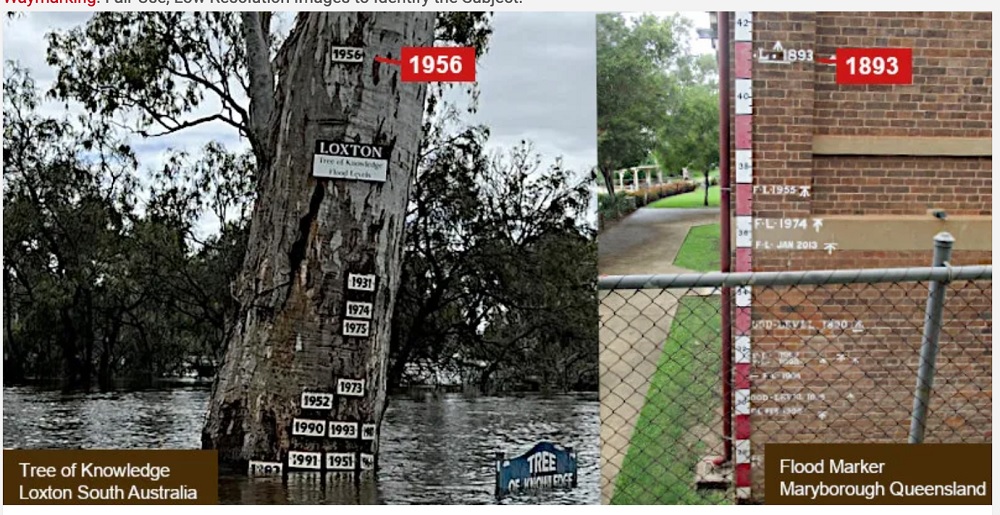
Bushfires
Bushfires are endemic in Australia. Deliberate controlled burning has been a feature of Australian land management for tens of thousands of years and resulted in the replacement of much rainforest with grasslands and more fire-tolerant eucalyptus. Modern fire prevalence is often attributed to global warming. Indeed, the alarmist Climate Council is seeking to raise money on the issue, claiming that wet weather across Australia over several years combined with global warming has brought an increased likelihood of catastrophic bushfires and grass fires.
The extent and ferocity of fires is largely a factor of land management. Environmental activists hostile to controlled burns have gained influence over these programs. Though post-mortems on fires have called for more burn-offs, these are seldom implemented.
Perhaps because of better recordings, fires over the past century have been more extensive, though there has not been an increase in recent decades.
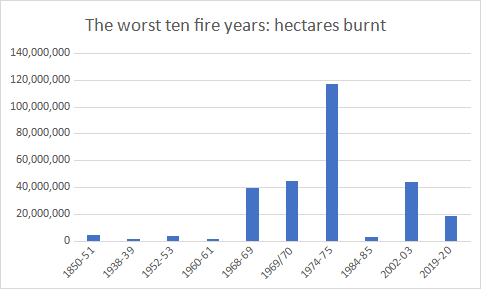
The Great Barrier Reef (GBR)
The GBR is often regarded as an indicator of climate change and has been the recipient of much government funding and considerable regulatory action.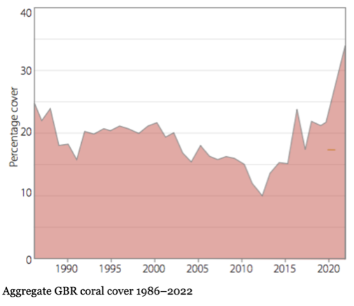
Peter Ridd, perhaps the world’s leading expert on coral reefs, has assembled the data on the GBR and other coral reefs. He shows the coral coverage over the GBR is presently at record levels and that, ‘Data for the East Asia Seas coral bioregion, with 30 per cent of the world’s coral reefs .. show no statistically significant net coral loss since records began.’
Concluding comments
Climate change is the harbinger for revolutionary change in economic management and political order. It is proving to be the justification for far-reaching intrusions in commerce and even in muting the freedom to express views.
Climate alarmism, married with a resurrection of the legitimacy of socialist interventions, an acceptance of higher government spending and a toleration of increased debt has legitimised harmful energy and land-use policies. In Australia (and elsewhere) it has provided the rationale for policies that discriminate against fossil fuels and subsidise wind and solar-based electricity, raising energy costs 2-3 fold above those previously prevailing. Further such policies are planned and will drive additional cost increases and reductions in reliability.





